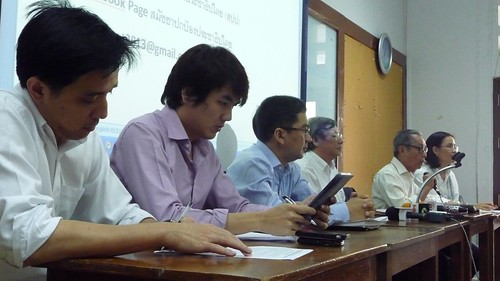About 150 Thai academics have on Tuesday denounced the proposal of the anti-government protesters to establish a “People’s Council” and royally-appointed caretaker government as legally impossible and undemocratic.
The network of academics, which calls itself the Assembly for the Defense of Democracy (AFDD), consists of 151 lecturers from over 10 universities across Thailand. The network includes noted historian Nidhi Eawsriwong and Charnvit Kasetsiri, Nitirat member Worachet Pakeerut, and political scientist such as Prajak kongkirati and Phuangthong Pawakapan.
 Academics from the Assembly for the Defense of Democracy holding press conference at Chulalongkorn University
Academics from the Assembly for the Defense of Democracy holding press conference at Chulalongkorn University
They said the demand of the protesters, who cite Article 7 of the Constitution to call for an intermediary Prime Minister, is legally impossible and aims to create a deadlock in the political system, leading to changes outside democratic method.
Article 7 of the Constitution stipulates “Whenever no provision of the Constitution is applicable to any case, it shall be decided in accordance with the Constitutional practice in the democratic regime of government with the King as Head of the State.”
Worachet Pakeerut, law lecturer from Thammasat University and Nitirat member, said that Article 7 is used to refer to Constitutional convention to fix loopholes in the written Constitution, as long as it is adopted democratically. It by no means allows to have royally-appointed Prime Minister, he said.
Suthep Thaugsuban, leader of the anti-government demonstrations, announced Monday after the prime minister dissolved the parliament, that he did not accept the government’s solution. Suthep said he would continue to protest until the unelected “people’s council” is established.
The protesters, led by the former Democrat MPs, said their ultimate goal is to rid Thailand of the “Thaksin regime,” a vaguely defined term which the protesters refer to the influence of former Prime Minister Thaksin Shinawatra, business tycoon and a highly polarising figure.
The anti-government protest also calls for the prime minister and the cabinet to resign from caretaker government in order to find an “intermediary Prime Minister” who would lead the “People’s Council”, a proposed legislative body whose members, it said, would come from selection and represent all professions in the society.
Piyabutr Sangkanokkul, law lecturer from Thammasat University and Nitirat member, rebutted the claim of the protesters that the Article 3 of the Constitution allows a People’s Council to be established, saying that it stipulates that the people can exercise direct power only through voting in referendums and in elections for MPs and senators.
Article 3 of the Constitution provides that the King as the head of state exercises the sovereign power of the people through the Parliament, the Council of Ministers, and the Court in line with the provisions of the Constitution.
The only way to establish the People’s Assembly is through charter amendment, said Piyabutr.
“The attempt to establish a People’s Council by using means other than the amendment of the Constitution is therefore an action in order to create administrative power in the country by a method that is not stipulated in the Constitution, or, a coup,” said the AFDD statement.

